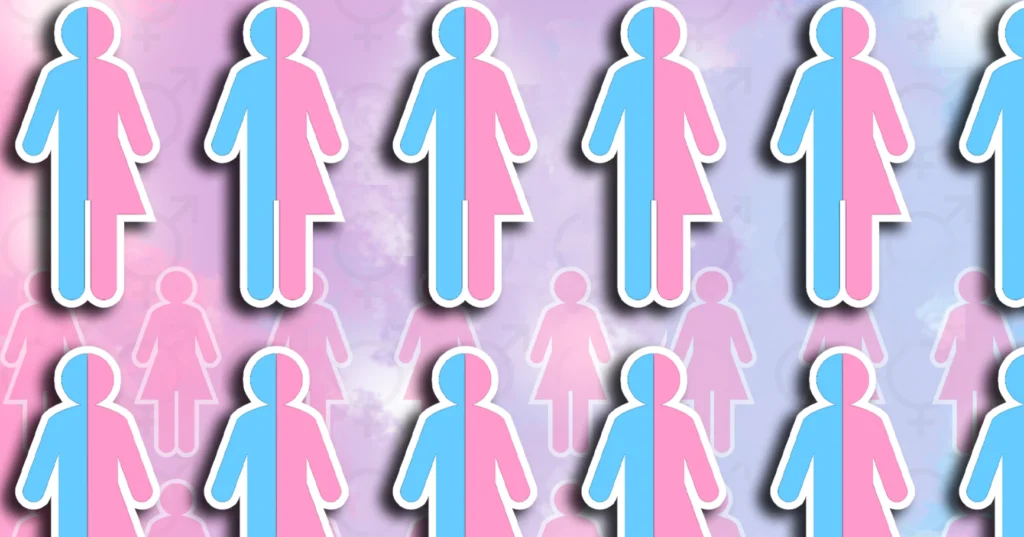Cisgender refers to individuals who identify with the gender assigned to them by a doctor at birth, aligning with their biological sex. It’s important to note that being cisgender doesn’t exclude someone from being a member of LGBTQIA+ communities.
How Does it Compare With ‘Straight’?
Cisgender is a term that pertains to an individual’s gender identity, not their sexual or romantic preferences. It is essential to understand that being cisgender does not automatically imply heterosexuality.
Being straight indicates that a person is either heterosexual or heteroromantic. This means they experience sexual or romantic attraction to individuals of a different gender than their own. For instance, a cisgender woman who identifies as straight may feel sexual or romantic attraction exclusively towards males.
However, it’s crucial to note that cisgender individuals can have diverse sexual and romantic orientations. They may experience attractions towards all genders, some genders, or no genders at all. For instance, a person can be cisgender and identify as gay, lesbian, bisexual, or asexual.
How Does it Differ from a Person’s Sex?
Cisgender individuals have a gender identity that aligns with the sex assigned to them by a doctor at birth. This assignment is typically based on the appearance of their external genitalia, which is determined by the 23rd pair of sex chromosomes inherited from their parents.
In most cases, people inherit either XX or XY chromosomes. When an individual inherits XX chromosomes, doctors often assign them as female at birth. On the other hand, when someone inherits XY chromosomes, they are typically assigned as male at birth.
However, it’s important to recognize that sex is not strictly binary. Some individuals may possess the sex chromosomes typically associated with males or females but have reproductive organs and genitalia that don’t fit traditional male or female characteristics. This condition is referred to as intersex.
If a doctor observes ambiguous genitalia in an infant, they may consider additional factors such as internal reproductive organs and hormone levels to determine the infant’s sex. Various tests, including physical examinations, ultrasound scans of internal organs, and blood tests to check genes and hormones, may be conducted to assist in establishing the infant’s sex.
It’s worth noting that being intersex does not necessarily mean one cannot be cisgender. According to the Intersex Campaign for Equality, intersex individuals may identify in different ways:
1. Some may identify as cisgender and align with the gender typically associated with the sex assigned at birth. They may use terms like “male,” “female,” “woman,” “man,” “intersex man,” or “intersex woman.”
2. Some may identify with the gender associated with the “opposite” sex assigned at birth.
3. Others may identify as neither exclusively a woman nor a man, while some may identify as both simultaneously.
How Does it Relate to ‘Gender’?
Gender is an intricate concept that interacts with, but should not be conflated with, sex.
According to the World Health Organization (WHO), gender is a societal construct that encompasses the norms, behaviours, and roles assigned to individuals based on their perceived sex. It dictates the expectations society has regarding how males and females should behave.

Examples of gender roles include females typically wearing traditionally feminine attire such as skirts and dresses, while also being expected to exhibit qualities like politeness, nurturing, and accommodation. On the other hand, males are often encouraged to display strength, assertiveness, and boldness.
It is important to note that gender roles are not fixed and can evolve over time, varying across different societies and cultures.
While cisgender individuals generally align with the gender assigned to them at birth and conform to societal gender norms, it is possible for someone to be cisgender and express themselves in a manner that challenges or defies traditional gender expectations. This means that individuals can be cisgender and still choose to dress or present themselves in a way that is considered gender non-conforming.
How Does it Relate to ‘Gender Identity’?
Cisgender is indeed a gender identity wherein individuals identify with the gender that corresponds to the sex assigned to them at birth. For instance, a cisgender male identifies as a man, while a cisgender female identifies as a woman.
Gender identity refers to how individuals perceive and understand their own gender. It may or may not align with the sex assigned to them at birth. Some individuals become aware of their gender identity during early childhood, typically around 3 to 5 years old. They may realize that their gender identity differs from the sex assigned at birth. On the other hand, some people may discover their gender identity later in life.
It’s also important to note that individuals have the autonomy to change their gender identity at any stage of their lives if they feel it better reflects their true selves.
Gender identity is a deeply personal and individual experience. It is up to each person to define and identify their own gender identity, and no one else has the authority to dictate or determine it for them. Some individuals may find it challenging to label or define their gender identity, and that is valid as well. Each person’s gender identity is unique and should be respected.
How Does it Relate to ‘Gender Expression’?
Gender expression refers to how a person outwardly presents and manifests their gender to others. It encompasses various aspects, including one’s physical appearance, behavior, hairstyle, clothing choices, as well as their preferred names and pronouns.
It is important to understand that gender expression does not necessarily have to adhere to societal gender norms or expectations. Individuals have the freedom to express their gender in diverse and unique ways that may deviate from traditional norms.
People of all gender identities have the ability to express their gender in a multitude of ways. Some individuals may feel comfortable expressing a more feminine gender, while others may prefer a more masculine expression. Additionally, some may opt for an androgynous gender expression, combining elements from both ends of the gender spectrum.
Ultimately, gender expression is a personal and individual choice that allows individuals to outwardly convey their gender identity in a way that feels authentic and true to themselves. It is essential to respect and support each person’s chosen expression without imposing societal expectations or limitations.
Summary
Cisgender individuals identify with the sex that was assigned to them by a doctor at birth. It’s important to note that being cisgender does not imply a specific pattern of attraction toward individuals of a different gender. Many members of LGBTQIA+ communities are cisgender.
While cisgender individuals may conform to societal expectations of gender norms and expressions, it’s essential to recognize that they can also be gender non-conforming. Gender non-conformity refers to behaviours, appearances, or expressions that do not strictly align with traditional gender norms, while still identifying with the sex assigned at birth.
People who are cisgender have diverse experiences and expressions of their gender identity. Some may choose to challenge or deviate from societal gender norms and expectations, embracing a gender non-conforming or non-stereotypical expression that aligns with their authentic selves. It’s crucial to respect and acknowledge these individual variations in gender expression among cisgender individuals.









